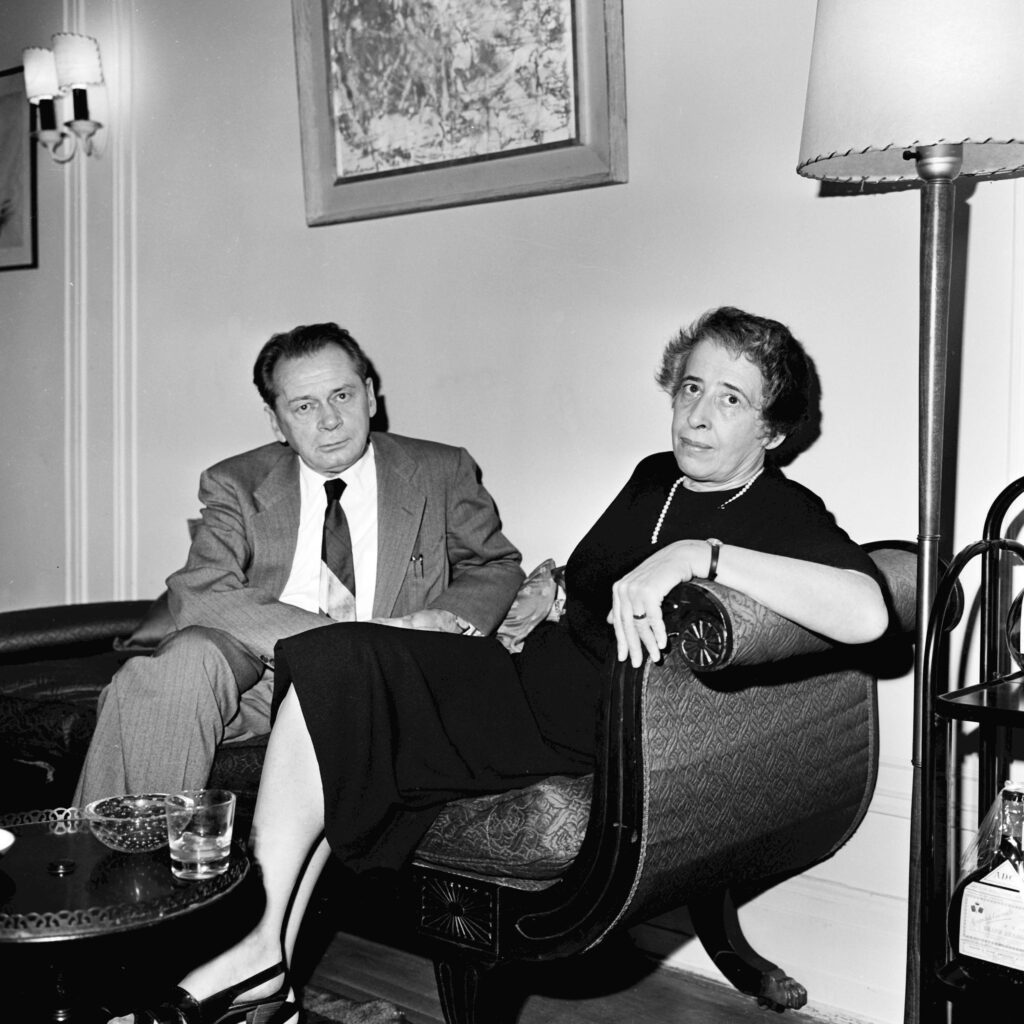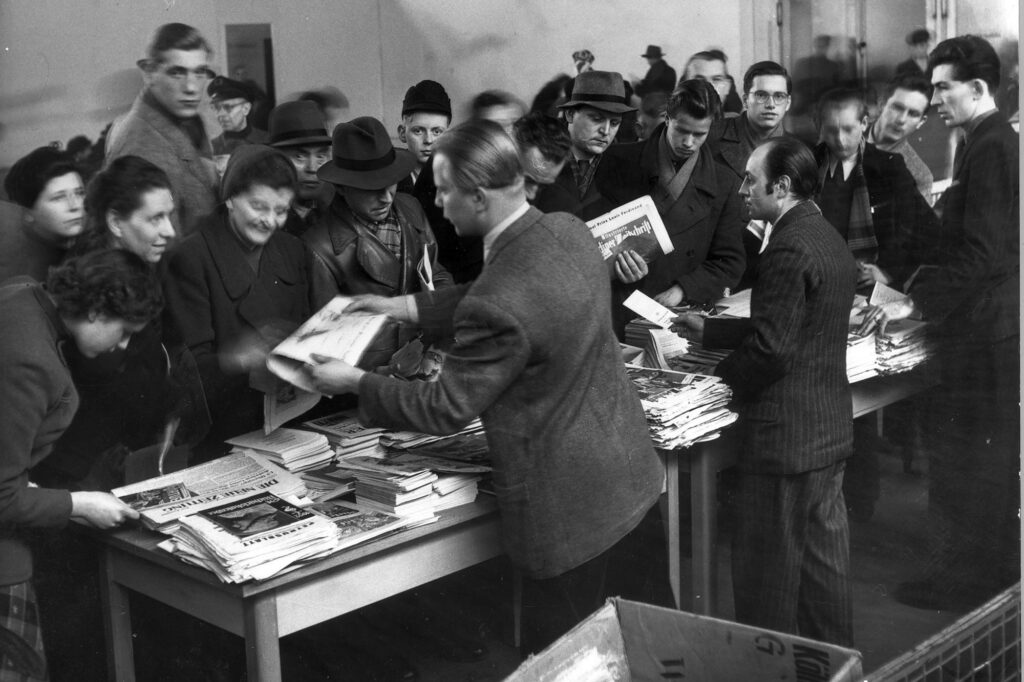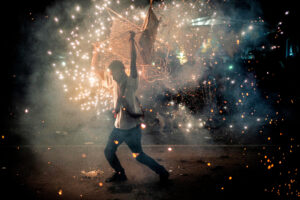My New York Intellectuals

I am not from New York. I am not Jewish. I am not a member of a Marxist group. I did not live through the 1930s and 1940s. I am a 27-year-old British-Nigerian who grew up in London. Yet the New York Intellectuals are my people.
They are my people because even though they had ample reason to be defined by their identity, they tried to transcend their personal circumstances with their wide-ranging embrace of culture. They didn’t see themselves, and they should not be seen, simply as Jewish New Yorkers who were advocating anti-fascism and anti-Stalinism in the middle of the 20th century; they possessed a universalist spirit. And this is a spirit to which I aspire.
I remember the wonder I felt reading my first James Baldwin essays from his 1955 collection Notes of a Native Son at my university library or watching I Am Not Your Negro, Raoul Peck’s excellent documentary about Baldwin, on a bright spring afternoon of 2017. I remember in my early 20s picking up Elizabeth Hardwick’s fat collection of criticism (published by NYRB Classics) in a second-hand bookshop and devouring it. I remember discovering the lives and works of other New York Intellectuals in Louis Menand’s monumental 2021 cultural history The Free World: Art and Thought in the Cold War.
I was captivated by the energy and fizz of Saul Bellow’s prose in The Adventures of Augie March when I read the book for the first time during the Covid-19 lockdown in the spring of 2020. I adore Hardwick for her stylish criticism: the way she can explain in rich and invigorating detail why the prose of Vladimir Nabokov is magical and the poetry of Elizabeth Bishop is perfect. And I revere Baldwin for his penetrating essays—for his ability to argue, for example, that moral protest should not be the objective of literature.
Even when I had no inkling of who any of the New York Intellectuals were or what they stood for, these professors and literary critics, novelists and essayists already were my people. Discovering them was like a homecoming. They spoke to me. Their way of seeing literature was—and is—my way.
The New York Intellectuals emerged from a particular historical and cultural context: Most were second-generation Jewish-American writers in the 1930s and 1940s fascinated by European Modernism and attracted to the anti-Stalinist radical Left. They wrote for publications like Partisan Review, Commentary and the New York Review of Books.
Norman Podhoretz, a Jew from Brooklyn, called them “the family.” As he wrote in his 1967 memoir Making It, the New York Intellectuals were “stuck with one another against the rest of the world, whether they liked it or not (and most did not), and preoccupied with one another to the point of obsession, and intense in their attachment and hostilities as only a family is capable of being.” Irving Howe, arguably the most incisive exponent of what they were about, wrote, “by birth or osmosis, they are Jews.”
The New York Intellectuals were disproportionately Jewish New Yorkers, yet many prominent members of the group were not. Bellow was Jewish but from Chicago; Hannah Arendt was Jewish and from Germany. Mary McCarthy came from a midwestern Irish-Catholic background. Dwight MacDonald and F.W. Dupee were of Anglo-Saxon Protestant stock. Baldwin was African-American. Hardwick was born to a Southern Protestant family and throughout her life retained a Kentucky accent.
They didn’t all come from the same racial, religious or urban background, but they did share other significant affinities. My kinship with them is based on those—not on a shared background, but on a shared approach to the relationship between art and politics.
The family looked out into the world. Alfred Kazin, another one of its members, brought out this tension when he recollected for Joseph Dorman’s 2000 book Arguing the World: The New York Intellectuals in Their Own Words: “The atmosphere at Partisan Review was both exciting because of the wealth of their interests, and insular because of the nature of these people themselves.” And as the sociologist Nathan Glazer, another one of the New York Intellectuals, said of them: “even as they became more openly Jewish, they could never shake their belief in a more expansive universalist agenda.”
Given these internal contrasts, some have wondered if the label “New York Intellectual” means anything in the first place. Robert Boynton wrote in the Atlantic in 1995: “anyone who steeps himself in the writings of these groups knows that there is no such person as the New York Intellectual or the black intellectual.”
What he meant was that the New York Intellectuals did not all believe in the same thing. They were not a cult. In fact, one of the things that distinguished them as a group was the fact that they argued so intensely with one another. Some (like Howe) always put a great emphasis on socialism and retained their allegiance to it throughout the Cold War. Others (like Podhoretz and Irving Kristol) ultimately abandoned leftist politics in favor of neoconservatism.

For me, what unites the New York Intellectuals beyond their differences in backgrounds and beliefs was their not wanting to be defined by their identity, as well as their conviction that culture matters on its own terms and should not be analyzed through the lens of politics. Many of them were in some way marginalized from the cultural mainstream and yet always insisted on learning and promoting—to use a famous quote from Matthew Arnold—“the best that has been thought and said in the world.”
I feel the same way. Despite our differences in background and age, I, like them, do not want to be defined simply by my identity. I also subscribe to their approach to literature: Being from a marginalized background should not prevent someone from embracing and engaging with the best of what has been thought and said.
Reading has been an integral part of my life since I was a boy; for the New York Intellectuals, reading was everything. Not only reading for pleasure, but reading to transcend one’s circumstances and upbringing. In my case, to be transported from the London suburb in which I grew up, from an immigrant middle-class background, into a universal world of culture.
In the case of many New York Intellectuals, expansive reading came out of the desire to not be confined by their Eastern European Jewish background. Glazer once said of his attraction to the Partisan Review:
I’ve always found it astonishing that educators believe the way to reach people is to discuss where they are. I was not interested in where I was. I was bored to death with where I was. If they were going to talk about life on the Lower East Side, I’d say what are you talking about? You want to talk about life in the shtetl, I didn’t care either. We wanted to learn about big things. We wanted to learn about great movements of history, great movements of ideas, the great novels, poems, music.
To learn about the “big things.” To learn about “the great movements of history, great movements of ideas, the great novels, poems, music.” For these intellectuals, learning was not a rite of passage; it was a life-long vocation and passion. Partisan Review published a Who’s Who of litterateurs from the 1930s and 1940s: the poetry of T.S. Eliot, Wallace Stevens, Marianne Moore and W.H. Auden; the critical essays of George Orwell and Arthur Koestler; the literary essays of Edmund Wilson. If you wanted an excellent education in transatlantic literary culture at that time, Partisan Review was the magazine to read.
The New York Intellectuals’ notion of culture was decidedly cosmopolitan. Their interests were expansive precisely because, as Jews, their upbringing had been so estranged from the literary and intellectual establishment. They pursued what they hadn’t been given by birth and upbringing.
Their example matters to many cultural and political debates today because it illustrates that we should not form an opinion of political outlook on the basis of cultural tastes: Just because someone is politically progressive does not necessarily mean they would reject what is sometimes called High Culture. Culture should be examined on its own terms.
The New York Intellectuals also matter because they rebut the impulse to analyze art through identity. This runs contrary to the assumption today that people from so-called marginalized backgrounds should study works by people from backgrounds like their own. Inclusivity is often invoked nowadays to defend this point of view. The argument goes: There is little racial and ethnic diversity in the kind of culture young people are exposed to, and that undermines their self-worth.
Many see sticking to a canon as an expression of reactionary politics, crudely exclusionary and reflecting the prejudices of a white and male establishment. But this view reduces the canon to a zero-sum game. In fact, writers from different racial and ethnic backgrounds are not locked in a perpetual conflict.
I think young people—indeed, anyone—should be exposed to a wide variety of art and culture. And what should guide their evaluation of those works is not the identities of the people who produced them, but the works’ individual aesthetic merits.
Is this a profoundly narrow form of cultural criticism? The New York Intellectuals had a comprehensive attitude to culture—one of the qualities that most attracted me to them. They were not specialists. They possessed, as Podhoretz put it, “the synoptic mind.” They drew connections between literature and politics, the past and the present, the particular and the universal.
This synoptic approach is useful for analyzing culture today. Writers from different backgrounds are always in conversation with one another. Zadie Smith is renewing the exuberant fiction of Charles Dickens for a 21st-century London; Derek Walcott is renewing the poetry of Homer from the vantage point of the Caribbean. Chinua Achebe wrote Things Fall Apart, one of the most influential African novels of the 20th century, partly as a rejection of two depictions of Africa by European writers he saw as racist: Joyce Cary’s Mister Johnson and Joseph Conrad’s Heart of Darkness. But his novel’s title is taken from a poem by William Butler Yeats, and the plot resembles the structure of a classic Greek tragedy.
Toni Morrison’s Song of Solomon is an enchanting tale about a young Black American man from Michigan called Milkman and his attempt to trace his lineage. It employs folklore and myths like that of the Flying Dutchman to explore the theme of Black liberation. But the book is not simply a great African-American novel; it is also a great American novel. It resembles the frontier novels of travel and adventure that characterized so much of 19th-century American fiction; it follows in the tradition of Mark Twain’s Huckleberry Finn and Herman Melville’s Moby Dick.
One might be tempted, moreover, to view the debate on the teaching of a canon simply as one of radicalism versus conservatism, progress versus tradition. But this would also be a severe mistake. Many of the New York Intellectuals, like Howe, retained a fiercely egalitarian spirit throughout their lives. At the same time, they, like other intellectuals throughout history, retained a deep love for High Culture—loving even culture that at times fiercely contradicted their political and moral beliefs.
W.E.B. Du Bois was one of the most influential radical Black thinkers of the 20th century. But he also loved the work of Richard Wagner, the racist German composer. Du Bois loved Wagner so much that in 1936 he attended the Bayreuth Festival, an annual celebration of Wagner’s work. Du Bois argued that “the musical dramas of Wagner tell of human life as he lived it, and no human being, white or black, can afford not to know them, if he would know life.”
Du Bois also famously said: “I sit with Shakespeare and he winces not. Across the color-line, I move arm in arm with Balzac and Dumas, where smiling men and welcoming women glide in gilded halls. From out the caves of evening that swing between strong-limbed earth and the tracery of the stars, I summon Aristotle and Aurelius and what soul I will, and they come all graciously with no scorn nor condescension.”
C.L.R. James, a Marxist from Trinidad and Tobago, was another radical thinker who mined the very Western civilization he might have had good reason to reject. “I didn’t learn literature from the mango-tree, or bathing on the shore and getting the sun of colonial countries,” he once wrote. “I set out to master the literature, philosophy and ideas of Western civilization. That is where I have come from and I would not pretend to be anything else.”
Baldwin, a key member of the New York Intellectuals and one of the leading advocates for the Civil Rights Movement in the 1960s, used to hate the work of Shakespeare. He associated it with the canon and saw it as something that had been denied to him because of his race. But he later grew to love Shakespeare, he said. And he did, Baldwin once wrote, because the playwright and poet was able to “defeat all labels and complicate all battles by insisting on the human riddle.”
This description of Shakespeare serves as a summary of Baldwin’s fiction and essays: resisting simplification, emphasizing complexity. But it also serves as a useful way of thinking about the New York Intellectuals more generally. For Baldwin and other New York Intellectuals, one should never sacrifice the “human riddle” in favor of a one-dimensional account of literature.
As Lionel Trilling, a professor of English at Columbia University and one of the founding fathers of the New York Intellectuals, wrote in his classic collection of essays The Liberal Imagination: “Literature is the human activity that takes the fullest and most precise account of variousness, possibility, complexity, and difficulty.”
To expect writers from marginalized backgrounds to be ideologically opposed to white, male writers is wrong as a matter of fact and wrong in principle. It undermines the actual relationship that exists between many writers from marginalized backgrounds and authors from other backgrounds and from the past. It undermines what literature should be for in the first place: emphasizing our universal humanity, not putting us into competing silos.
Many of the New York Intellectuals abandoned dissident leftism in favor of authoritarian anticommunism. In 1933, Sidney Hook, who was always more passionate about political theory than literature, wrote a program for a revolutionary communist party called the American Workers Party. By 1953, he was arguing that members of the Communist Party should be banned from teaching in American schools and universities.
The New York Intellectuals were not all united by a shared background or a shared politics, nor necessarily by shared values. They were bound by something more like a shared sensibility about the relation between politics and culture, a sense of the inherent distinction between the two: Culture is not simply an extension of politics; we should not infer one from the other.
For the New York Intellectuals, there was no tension between valuing the literary canon and espousing progressive beliefs, or any other political framework. More than anything, they despised provincialism: They were Americans but Americans open to the rest of the world.
The literary critic Adam Kirsch, in an essay on the influence of Jewish-American writers on the wider American canon, expressed what I feel whenever I think of the New York Intellectuals: “… the truth is that the American literary inheritance can be passed down to anyone who wishes to claim it. That category includes only a few people in any American generation, but they can be Jewish, black, Asian, or anything else, as easily as they can be Anglo-Saxon Protestants.”
I am a British-Nigerian Londoner, and I want to claim the legacy of these Jewish-American New Yorkers. Almost all of them are dead. Their world has vanished. Partisan Review is defunct, and you can only access it through clunky pdf files or second-hand copies from online retailers; it is rare nowadays to find people writing for both Commentary and the NYRB. But the legacy of the New York Intellectuals is alive.
I couldn’t give a fig for their politics or background. What drew me to them is what has been my guiding sensibility since that day when I was 10 and my school gave me an encyclopedia: the pursuit of knowledge and culture for its own sake. Culture is not an extension of politics. It is its own thing.


